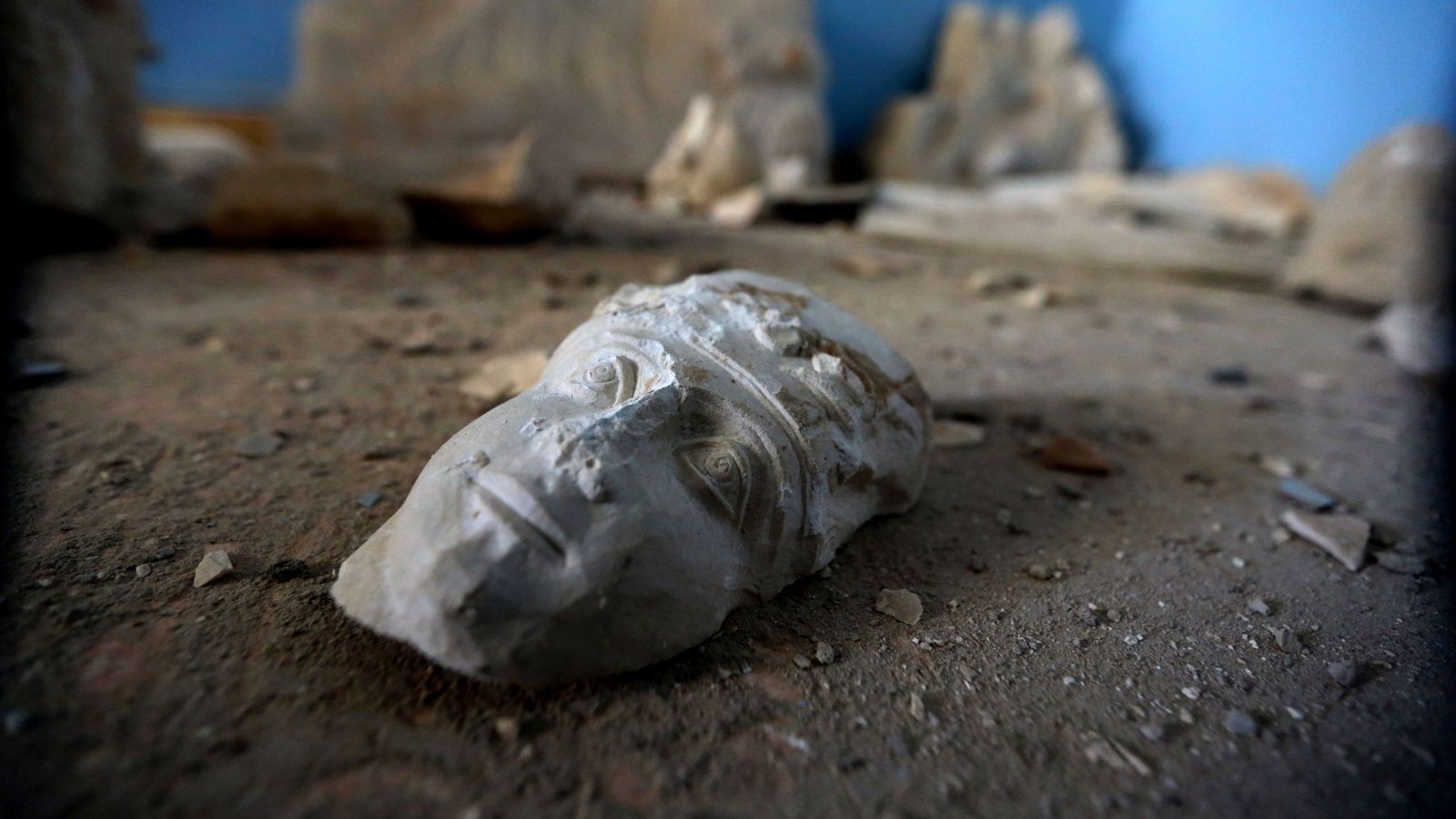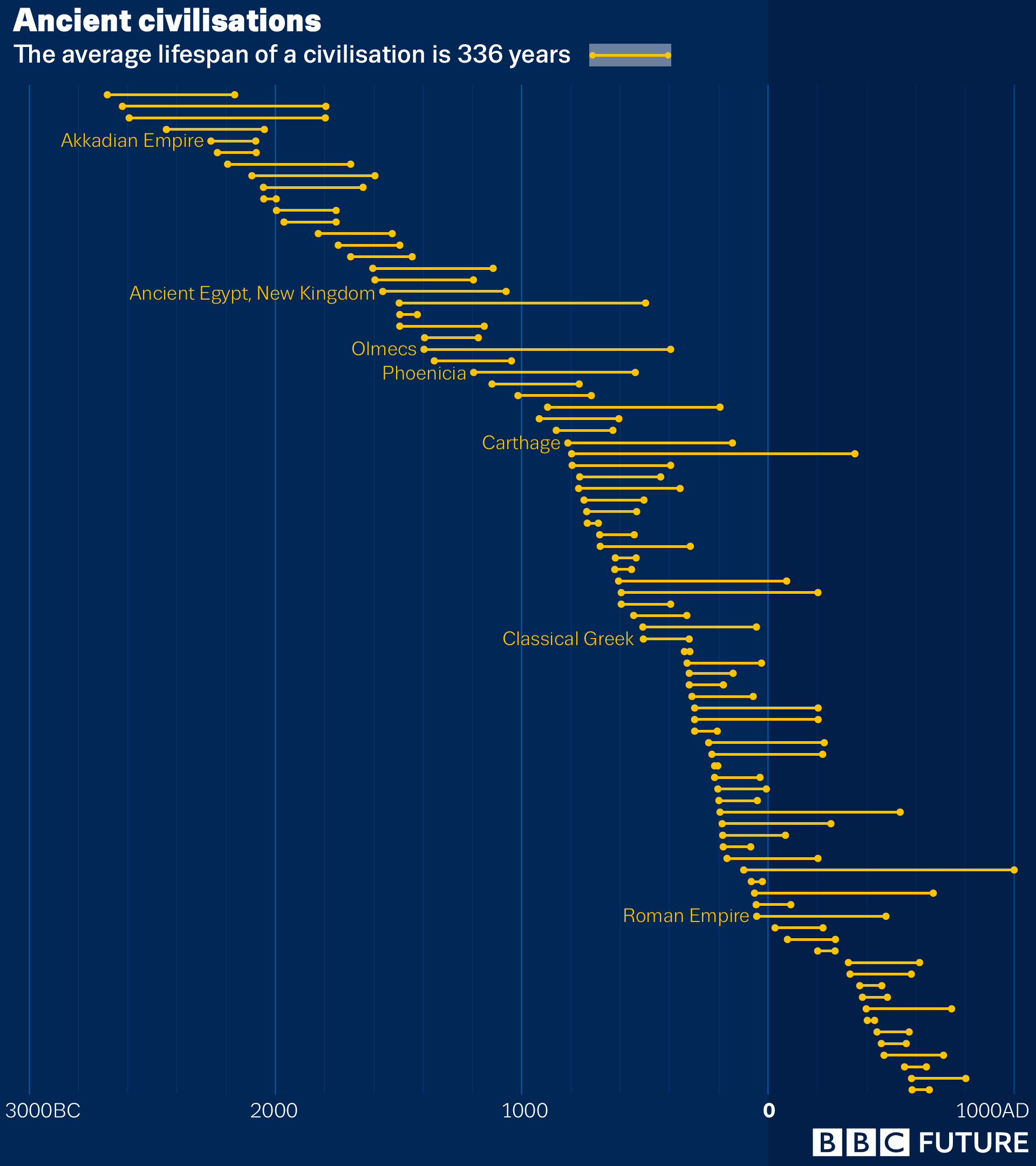'How Do You Know If You're Living Through The Death Of An Empire?' It's the Little Things
Last edited Fri Sep 4, 2020, 04:42 PM - Edit history (6)
'How Do You Know If You’re Living Through the Death of an Empire? It’s the little things. By Patrick Wyman, *March 19, 2020. Mother Jones. - Excerpts, Ed.:
The fall of an empire is supposed to be a dramatic thing. "Fall” conjures up images of fluted temple columns toppling, pulled down by fur-clad barbarians straining to destroy something beautiful. Savage invasions, crushing battlefield defeats, sacked cities, unlucky rulers put to death: The stories that usually come to mind when we think of the end of an empire. They seem appropriate, the climaxes we expect from a narrative of rise, decline, and fall. We’re all creatures of narrative, and stories are one of the fundamental ways in which we engage with and grasp the meaning of the world.
It’s natural that we expect the end of a story—the end of an empire—to have some drama. The reality is far less exciting. Any political unit sound enough to project its power over a large geographic area for centuries has deep structural roots. Those roots can’t be pulled up in a day or even a year. If an empire seems to topple overnight, it’s certain that the conditions that produced the outcome had been present for a long time— wounds that finally turned septic enough for the patient to succumb to a sudden trauma.

- The Colosseum in Rome, with classical orders used only for effect.
That’s why the banalities matter. When the real issues come up, healthy states, the ones capable of handling and minimizing everyday dysfunction, have a great deal more capacity to respond than those happily waltzing toward their end. But by the time the obvious, glaring crisis arrives and the true scale of the problem becomes clear, it’s far too late. The disaster—a major crisis of political legitimacy, a coronavirus pandemic, a climate catastrophe—doesn’t so much break the system as show just how broken the system already was. I spent almost a decade thinking about the end of the Roman Empire. Academics, being academics, agree on very little about the topic. The idea of “fall” is now passé, for better and for worse; scholars prefer to speak of a “transformation” of the Roman world taking place over centuries, or better still, a long, culturally distinct, and important-in-its-own-right Late Antiquity spanning the Mediterranean world and beyond.
If the Roman Empire did ever come to a real end, all agree, it was a long, slow process spanning many lifetimes—hardly the stuff of dramatic narratives. There are still a few catastrophists out there, but not many.

- Bust of Caligula from the Palazzo Massimo in Rome.
While the eastern half of the Roman Empire survived in some form for the next thousand years, brought to an end only by the Ottoman sultan Mehmed the Conqueror in 1453, the Roman Empire in the west did in fact come to an end. After a certain point, either 476 (Romulus Augustulus) or 480 (Julius Nepos), there was no longer an emperor in Ravenna claiming authority over the vast territory it had encompassed, stretching from the sands of the Sahara to the moors of northern Britain. Supply wagons laden with grain and olive oil for garrisons of Roman soldiers no longer rolled along roads maintained at state expense. The villas everywhere from Provence to Yorkshire in which Roman aristocrats had passed their time, plotting their election to town councils and composing bad poetry, fell into ruin. Depending on the time, place, and the identity of the observer, this process could look and feel much different.

- The Roman Baths in the City of Bath, Somerset, England.
Let’s say you were a woman born in a thriving market town in Roman Britain in the year 360. If you survived to age 60, that market town would no longer exist, along with every other urban settlement of any significant size. You lived in a small village instead of a genuine town. You had grown up using money, but now you bartered—grain for metalwork, beer for pottery, hides for fodder. You no longer saw the once- ubiquitous Roman army or the battalions of officials who administered the Roman state. Increasing numbers of migrants from the North Sea coast of continental Europe—pagans who didn’t speak a word of Latin or the local British language, certainly not wage-earning servants of the Roman state—were already in the process of transforming lowland Britain into England. That 60-year-old woman had been born into a place as fundamentally Roman as anywhere in the Empire. She died in a place that was barely recognizable. Let’s consider an alternative example.

- The Pont du Gard Aqueduct in Southern France.
Imagine you were lucky enough to have been born the son of an aristocrat in Provence around the year 440. If you survived to the age of 60, your life at the end would not seem drastically different from what it was at the beginning.
You paid your taxes, assuming you couldn’t dodge them, to a Burgundian or Visigothic king rather than a Roman emperor. Other than that, your life was pretty much the same...
More, https://www.motherjones.com/media/2020/03/how-do-you-know-if-youre-living-through-the-death-of-an-empire/
________________
https://en.wikipedia.org/wiki/Roman_Empire
**Related & Recd: 'The Unravelling of America,' Rolling Stone, Aug. 6, 2020. Even great empires have their day. "No empire long endures, even if few anticipate their demise. Every kingdom is born to die. The 15th century belonged to the Portuguese, the 16th to Spain, 17th to the Dutch. France dominated the 18th & Britain the 19th."
https://democraticunderground.com/1016265478
__________

OTHER PERSPECTIVES:
- 'Are We On The Road To Civilization Collapse?' Luke Kemp, BBC, Feb. 18, 2019
https://www.bbc.com/future/article/20190218-are-we-on-the-road-to-civilisation-collapse
Studying the demise of historic civilisations can tell us how much risk we face today, says collapse expert Luke Kemp. Worryingly, the signs are worsening. Great civilisations are not murdered. Instead, they take their own lives. So concluded the historian Arnold Toynbee in his 12-volume magnum opus A Study of History. It was an exploration of the rise and fall of 28 different civilisations. He was right in some respects: civilisations are often responsible for their own decline. However, their self-destruction is usually assisted.
The Roman Empire was the victim of many ills including overexpansion, climatic change, environmental degradation & poor leadership. It was also brought to its knees when Rome was sacked by Visigoths in 410 & the Vandals in 455. Collapse is often quick & greatness provides no immunity. The Roman Empire covered 4.4 million sq km in 390. Five years later, it had plummeted to 2 million sq km. By 476, the empire’s reach was zero.
The first way to look at past civilisations is to compare their longevity. This can be difficult, because there is no strict definition of civilisation, nor an overarching database of their births and deaths. In the graphic below, I have compared the lifespan of various civilisations, which I define as a society with agriculture, multiple cities, military dominance in its geographical region and a continuous political structure. Given this definition, all empires are civilisations, but not all civilisations are empires. The data is drawn from two studies on the growth and decline of empires (for 3000-600BC and 600BC-600), and an informal, crowd-sourced survey of ancient civilisations (which I have amended).

Collapse can be defined as a rapid and enduring loss of population, identity & socio-economic complexity. Public services crumble & disorder ensues as government loses control of its monopoly on violence. Virtually all past civilisations have faced this fate. Some recovered or transformed, such as the Chinese & Egyptian. Other collapses were permanent, as with Easter Island. Sometimes the cities at the epicentre of collapse are revived, as with Rome. In other cases, such as the Mayan ruins, they are left abandoned as a mausoleum for future tourists. What can this tell us about the future of global modern civilisation? Are the lessons of agrarian empires applicable to our post-18th c. period of industrial capitalism? Collapse may be a normal phenomenon for civilisations, regardless of their size & technological stage. I would argue that they are.
Societies of the past & present are just complex systems composed of people & technology. The “normal accidents” theory suggests that complex technological systems regularly give way to failure. So collapse may be a normal phenomenon for civilisations, regardless of their size & stage. While our scale may now be global, collapse appears to happen to both sprawling empires & fledgling kingdoms alike. There is no reason to believe that greater size is armour against societal dissolution. Our tightly-coupled, globalised economic system is, if anything, more likely to make crisis spread...More at Link above.

Binkie The Clown
(7,911 posts)... that the average person who lived through the fall of the Roman Empire didn't even realize that it was happening at the time, or even afterwards. It was little year-by-year changes that they had time to grow accustomed to.
Hekate
(100,133 posts)...enough historical context. This article, which I will try to read at the link, may be just what I needed.
During Bush/Cheney a transformation in my emotional relationship with my country took place, in that I began to feel more relationship to my city and region than my nation. Washington DC and its political doings seemed entirely remote, and my perceived ability to bring about change virtually evaporated.
I began to wonder if this was how it felt to be a Roman citizen in, say, Provence in France. You would have the common language of Latin, the money, the roads and commerce. You knew you were part of a great Empire. But how very far away Rome was from your daily concerns and how little chance you ever had of being heard in Rome or effecting the slightest change there.
I put that thought down when Barack Obama was president — and now with Trump we are experiencing a mad king with venal courtiers, and the barbarians are at the gates, ready to sack and burn our Capital city.
Edited to add just one more thing: I’ve been so stunned by the sheer speed of the fascistic takeover and gutting of our federal government that it took me 3 years to realize that for it to have happened at all, very important underlying structures had to have rotted away. Such as the agreement that there are 3 co-equal branches of government, and that they work in co-operation with each other — that no one part of it should ever just decide to have a government shutdown for any reason.
Thanks for the post and the link
flying rabbit
(4,945 posts)Hekate
(100,133 posts)appalachiablue
(43,939 posts)but maybe more realistic. Particularly in the sense that there have been some empires, actually few where a strong epicenter survived fairly well, but not so in the other areas. This is more how I see the US shaping up already and actually for the last 5+ years- strength on the coasts but the interior vastly different, a process of downward direction for some time. Maybe when Biden- Harris get in it can improve. (The lunies will be even more aggressive when he loses & bold if he wins, dog forbid).
I understand how you feel more connected to your city and area, I think many people are experiencing this esp. of late. Quite a few prominent thinkers have observed how we're fragmenting. Several years ago when I started reading a lot, I sensed the strong move away from democracy and toward fascism and authoritarianism, but could't really pinpoint when and why. I can now. I tried to warn some educated, fairly political close ones then, but they weren't interested. And they're not as attunded to political affairs as I am. So I dropped the matter with most.
This country which I've been lucky enough to see a good deal of is beautiful, although I must say now I would be hesitant to re-visit areas that I enjoy because of the intensifying politics, extremism and dangers, sad but the way it is.
- The BBC writer also points out rightly, like others that we're so global and interconnected now that negative effects will move through the whole system, sort of like the human body or other entities. It helps me to think of the changes in terms of how some families decline, neigborhoods and states deteriorate, ideologies and more decline-- unless they are lucky enough to experience an infusion of some kind that enables stabilization and possible revival.
Well done post, impt. points. It's distressing to see how fast the recent changes have occurred & 'rot' is the truth.
-----
> I’ve been so stunned by the sheer speed of the fascistic takeover and gutting of our federal government that it took me 3 years to realize that for it to have happened at all, very important underlying structures had to have rotted away. Such as the agreement that there are 3 co-equal branches of government, and that they work in co-operation with each other — that no one part of it should ever just decide to have a government shutdown for any reason.
